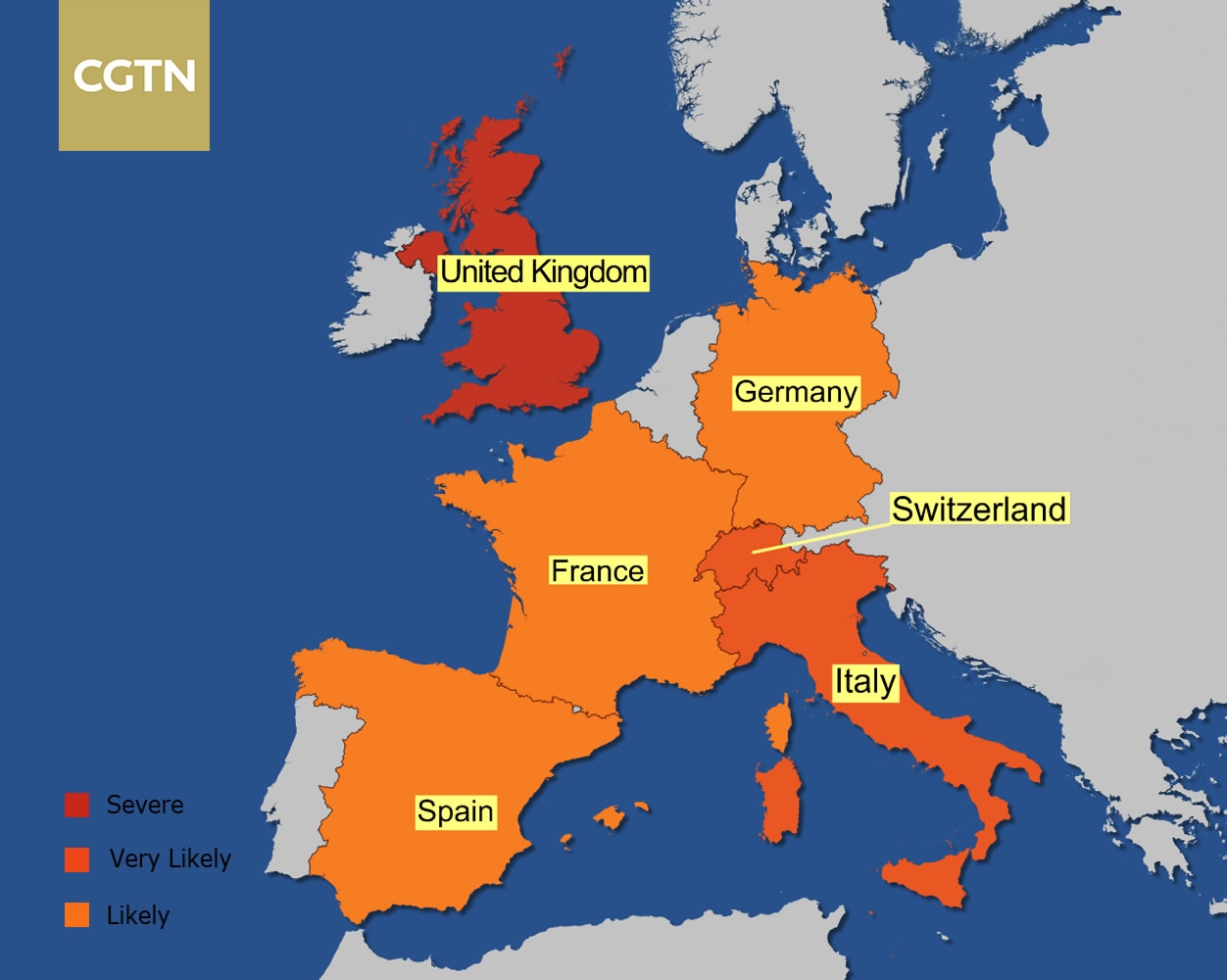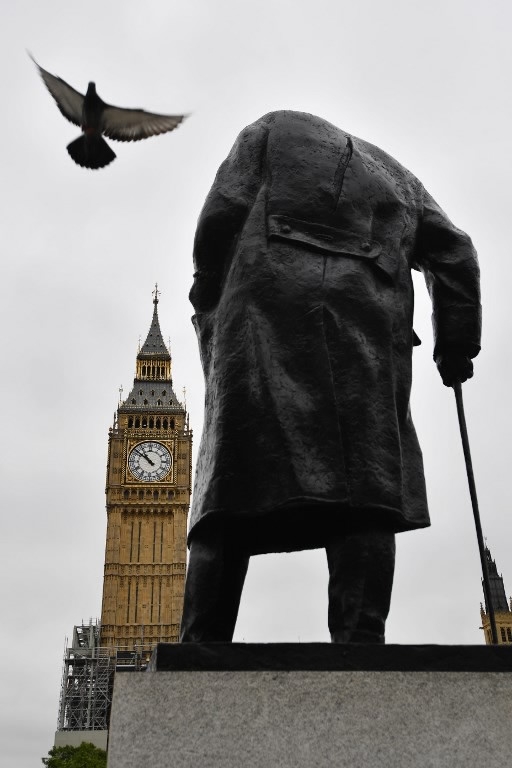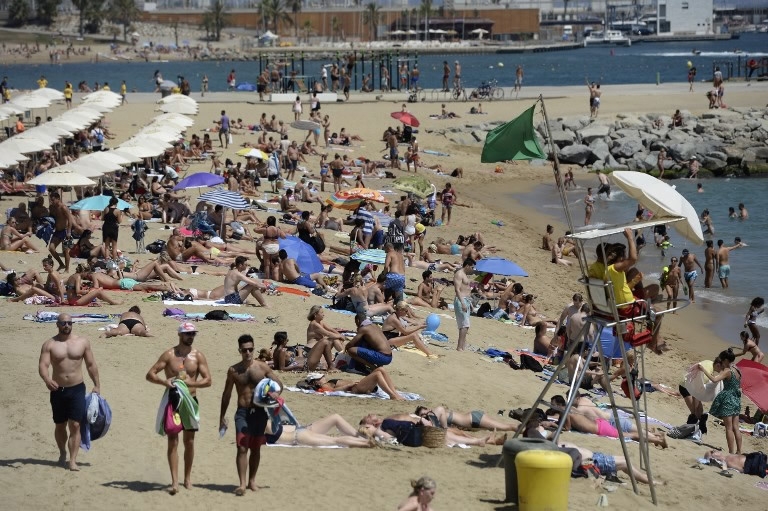Terrorist attacks in recent years have left Europe shaken, bleeding and on high alert. Paris, Brussels, London and Barcelona were once much-admired oases of safety, but are now reeling from a string of security incidents that have put the cities on lockdown, disrupted the everyday life of residents and caused major concerns among travelers.
On the last day of August, the US Department of State updated its travel alert for Europe, warning citizens of “the continued threat of terrorist attacks” there. Last week, the Counter-Terrorism Bureau under the National Security Council urged Israeli holidaymakers heading to Western and Northern European countries to remain vigilant. China’s Ministry of Foreign Affairs also issued a travel advisory back in July, calling on tourists to be cautious when heading overseas.

Different terror threat levels in some of the hottest European destinations for Chinese tourists (data from British Foreign and Commonwealth Office). /CGTN Photo
Different terror threat levels in some of the hottest European destinations for Chinese tourists (data from British Foreign and Commonwealth Office). /CGTN Photo
The deteriorating public security situation in Western European countries has had its toll on the tourism sector, with travelers increasingly shying away from their dream destinations of fear they find themselves in the wrong place at the wrong time. The appeal of these countries for Chinese tourists will be put to the test in a couple of weeks when an estimated six million holidaymakers will cross the borders and make trips around the world, benefiting from the eight-day Golden Week holiday marking the country’s National Day.
But how safe exactly are some of the hottest European destinations for Chinese tourists? A look at the terror threat levels in countries across the continent tells a story of caution, concern and chronic anxiety.
UK
Security status: Terrorist attack ‘highly likely’

Big Ben is seen at the Houses of Parliament in London on August 21, 2017 ahead of the final chimes of the famous bell before renovation works begin. /AFP Photo
Big Ben is seen at the Houses of Parliament in London on August 21, 2017 ahead of the final chimes of the famous bell before renovation works begin. /AFP Photo
Chinese tourists had a newfound interest in the UK following the Brexit vote as the subsequent slump in sterling (tumbling to a 31-year low against the greenback in January 2017) meant their extravagant shopping sprees would not burn a hole in their wallets. During this year’s Chinese New Year holiday, the UK was the second most popular destination booked by Chinese travelers, according to data by travel analysis firm ForwardKeys, which also showed Chinese flight bookings to the country between November 2016 and January 2017 grew 17 percent on an annual basis.
But the home of Shakespeare, the Beatles and the Duke and Duchess of Cambridge has been hit hard by terrorism.
Five terror attacks have rattled the UK in the past six months, with the latest occurring last week when an explosion struck the Parsons Green tube station. Following the incident, the terror threat level was upgraded to the highest possible level “critical,” marking only the fourth such move since the national threat level system was introduced in 2013 during the government of former Prime Minister Tony Blair. On Sunday, it was downgraded back to “severe,” meaning an attack is “highly likely” but no longer “expected imminently.”
France
Security status: State of emergency for 17 months

A couple stands under the arcades of the "Place carree" (Court Square) at the Louvre Museum, on September 15, in Paris. /AFP Photo
A couple stands under the arcades of the "Place carree" (Court Square) at the Louvre Museum, on September 15, in Paris. /AFP Photo
Once the unmatched Number 1 on the bucket list of Chinese travelers, France is now struggling to lure in tourists for a taste of culture, croissant and café au lait.
Tourism prospects of the City of Lights have dimmed, after its famous landmarks, from the Eiffel Tower and the Louvre Museum to the Champs-Élysées and Bataclan Theater, witnessed gruesome terrorist attacks and bloodshed. In 2016, French authorities reported that the country saw a 23 percent decrease in visitors from China between January and October in comparison with the same period a year earlier.
The country has been paralyzed by the longest uninterrupted state of emergency since the 1960s. It was declared in the wake of Paris attacks in November 2015 and is expected to expire in November 2017, following six extensions.
As recent as June, French Minister Gérard Collomb admitted that the domestic terror threat level cannot be eased as “the terrorist threat to France shows no sign of abating. The hardest is predicting when and where terrorists will attack.”
Spain
Security status: Fresh terrorist attacks

Tourists sunbathe on a beach of Barcelona on August 21, 2017. /AFP Photo
Tourists sunbathe on a beach of Barcelona on August 21, 2017. /AFP Photo
The trinity of sun, sand and sea has made Spain a hot destination for Chinese tourists with the Mediterranean country becoming the fastest-growing holiday getaway for globetrotters from the Middle Kingdom, according to ForwardKeys.
During the Chinese New Year in January, Spain was the top destination for outbound Chinese tourists. However, the country recently fell victim to terrorism.
Last month, two car-ramming attacks took place in Las Ramblas boulevard in Barcelona and the nearby coastal town of Cambrils just hours apart, killing a total of 14 people. Three Chinese tourists, including one from Hong Kong and a mother and her daughter from Taiwan were wounded.
Spain’s domestic terror threat level was upped in 2014 and then again in 2015 to the second-highest level "high risk," following a spate of attacks in Europe and North Africa, more specifically Tunisia. It has been in place ever since.
Germany
Security status: High terror threat level

Tourists with a selfie stick and a smartphone take a picture near a fountain in front of the Old Museum (Altes Museum) in Berlin on August 7, 2016. /AFP Photo
Tourists with a selfie stick and a smartphone take a picture near a fountain in front of the Old Museum (Altes Museum) in Berlin on August 7, 2016. /AFP Photo
Germany is one of the traditional European draws for Chinese tourists, having enjoyed over 30 percent annual growth in arrivals from China last year, according to the China Outbound Tourism Research Institute (COTRI). The institute has noted that the country managed to reduce its tourism losses resulting from safety scares thanks to Chinese business travelers who are less prone to nix their travel plans following a terror attack.
The country of Bach, Beethoven and Brühwurst (scalded sausage) has had its share of safety-related incidents in 2016. Last Christmas, a truck rammed into a market in central Berlin, killing 12 people and injuring 48 others. A few months earlier, in October, a knife-wielding attacker killed a teenager.
Germany's terror threat “is high, it has been high before yesterday’s horrible events and will remain high,” the spokesperson for the country’s Interior Ministry said in the wake of the Barcelona and Cambrils attacks.
Italy
Security status: No history of terror attacks

Tourists walk in front of the Battistero di San Giovanni (Baptistery of Saint John), on April 1, 2017 in Florence. /AFP Photo
Tourists walk in front of the Battistero di San Giovanni (Baptistery of Saint John), on April 1, 2017 in Florence. /AFP Photo
For plenty, Italy is the romantic gondola rides through the Venetian romantic canals, the star-studded fashion events in Milan and the afternoon spent in the vineyards of Florence. And Chinese tourists have long been smitten by the country’s charm. Last year, half a million visas to Italy were issued on the Chinese mainland. The first three months of this year saw a 15 percent annual increase of visa issuance.
The country has been spared the atrocities of terrorist activity, although questions have been made over whether terrorist cells have been active under the radar in Italy.
Anis Amri, the Tunisian suspect who attacked the Christmas market in Berlin, was fatally shot on the outskirts of Milan and is believed to have been radicalized while serving time behind bars in Sicily. Meanwhile, the man believed to have plowed through a crowd in Nice celebrating Bastille Day in July 2016 has resided in the town of Ventimiglia, some seven kilometers from the French-Italian border.
Switzerland
Security status: No history of terror attacks but concern remains

Members of a ski touring group climb adjacent to the Bec des Rosses mountain on April 3, 2017 above the Swiss Alps resort of Verbier. /CFP Photo
Members of a ski touring group climb adjacent to the Bec des Rosses mountain on April 3, 2017 above the Swiss Alps resort of Verbier. /CFP Photo
With China preparing for the 2022 Winter Olympics, an increasing number of Chinese have taken a fancy to winter sports, heading to the towering snow-capped Alps. China is the fourth-largest source of tourists to Switzerland, accounting for 7.5 percent of the foreign arrivals.
Switzerland has not been a target of jihadist attacks, but that did not stop the Federal Intelligence Service (FIS) from announcing during its annual risk assessment in May that “In Switzerland, the terrorist threat remains at a heightened level.”









